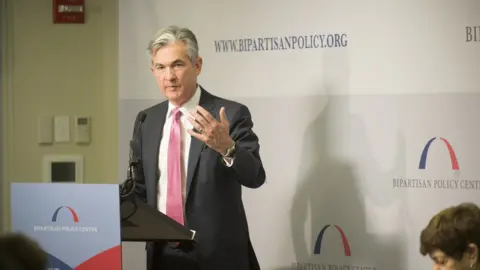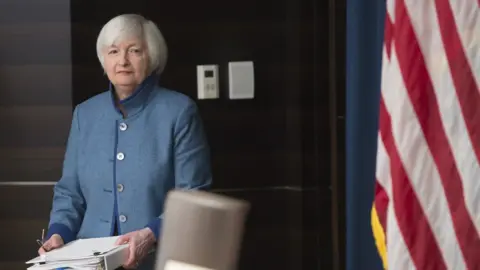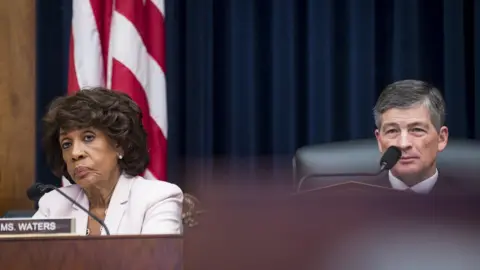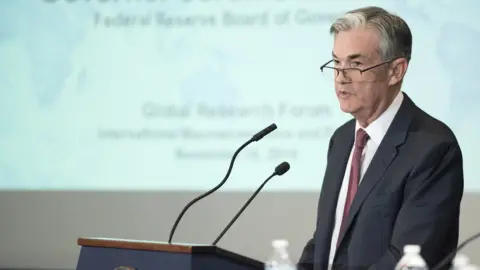Jerome Powell: Who is Trump's Fed chair nominee?
 Federal Reserve Board
Federal Reserve BoardBefore he was president, Donald Trump campaigned to rid Washington of insiders and blasted the Federal Reserve's efforts to boost the US economy as "reckless".
Judged on those terms, Jerome Powell, whom the president named this week to lead the US central bank, is a bit of a surprise.
Mr Powell, 64, is a Washington native, a Princeton graduate and former partner in the Carlyle Group - one of the world's biggest investment companies.
Among the candidates President Trump was considering, he was widely regarded as a safe choice - a change but one that would not rattle markets.
A Republican, Mr Powell - known as Jay - has served on the Federal Reserve board since 2012, voting with the majority on issues such as interest rates.
He also brings a background as a moderate conservative on charged political questions such as national debt and bank regulation.
"It is a way to have a Republican but at the same time, not to rock the boat," said Sebastian Mallaby, a fellow at the Council on Foreign Relations and author of a book on long-time Fed chair Alan Greenspan.
How did he get to the Fed?
Mr Powell, low-key, known to play golf and sometimes ride his bike to work, trained as a lawyer at Georgetown Law.
If confirmed by the Senate, he would be the first chair in decades without an economics degree.
Married with three children, his time at Carlyle has helped make him one of the Fed's richest members, with income estimated between about $20m and $55m.
That fortune, as well as his lack of traditional credentials, gives him something in common with many of the president's other appointees.
But Mr Powell owes his initial post on the Fed's board of governors to former President Barack Obama.
 AFP/Getty
AFP/GettyMr Obama noticed him in 2011 as he battled Congress to raise the national debt limit.
Mr Powell - then working for the Bipartisan Policy Center, a Washington think tank - published a report outlining the costs of inaction.
His appointment was packaged with that of a more liberal colleague in a bid to ease confirmation in the Senate.
Mr Powell "is a guy who's very pragmatic and very much in the centre", said economist R Glenn Hubbard, dean of Columbia Business School, who has known Mr Powell since they both worked in government in the early 1990s.
Where does he stand on interest rates?
If confirmed, Mr Powell will take over next year at a critical moment for the Fed, as the bank debates a shift away from recession-era policies aimed at boosting the economy.
Mr Powell has spoken in favour of gradual rate hikes and a modest unwinding of its balance sheet. He said he expects the Fed to hold onto $2.5trn to $3trn in assets.
As a Fed governor, Mr Powell was worked on issues related to the benchmark interest rate known as LIBOR; participated in a committee focused on communication; and led this year's review of stress tests for major banks - the first time in seven years that all firms under review cleared both parts of the review.
He has also called for less regulation for small and medium-sized banks and for an overhaul of government housing finance agencies.
Much about Mr Powell's views on monetary policy remain unknown.
"It's been pretty quiet for a while, but now it's approaching a time where there's a lot of uncertainty and maybe some possible disagreement about what they should do next," said Joseph Gagnon, a former Fed economist who is now senior fellow at the Petersen Institute for International Economics.
"Interestingly ... [he] is probably the [candidate] who has written the least and has the least history of talking about monetary policy."
What challenges is he facing?
The Fed has raised interest rates four times since 2015, gradually lifting the cost of borrowing. It has also started to reduce its balance sheet of Treasuries and mortgage-bonds, allowing securities to mature without reinvesting.
Some say the Fed has moved too slowly during the recovery, pointing to the low unemployment rate. But others are concerned that inflation remains low and raising rates could chill economic activity.
 Getty Images
Getty ImagesMr Mallaby described Mr Powell as "risk-averse" and said that carried its own peril, given the economic and political uncertainties facing the Fed.
Hard-right Republicans want to increase oversight of the bank, while rolling back industry regulations.
President Trump, who has not been shy about attacking institutions typically outside a chief executive's purview, also wants less stringent rules and has praised low interest rates.
That could put him in conflict with the Fed as the bank pursues higher rates.
"The political threat to the Fed's independence both from Trump and from members of Congress is the biggest threat ... in a quarter of a century," said Mr Mallaby.
"So the next chairman needs to be adept at playing Washington."
How does Mr Powell stack up?
Mr Powell cut his teeth in government while serving in the Treasury Department under former President George HW Bush, as regulators responded to issues with Treasury auctions from traders at Salomon Brothers.
He was part of the team that tightened trading procedures in response to the scandal, but persuaded legislators against more sweeping regulations.
 Federal Reserve
Federal ReserveWilliam Heyman, chief investment officer at insurer The Travelers Cos, who knows Mr Powell from that period and counts him as a friend, described him as "bipartisan to the point of being almost non-partisan".
"He will be a balanced, bipartisan chairman," said Mr Heyman, who also served in government at the time and got to know Mr Powell over occasional games of tennis.
"I don't think he will let politics undermine the independence of the Fed."
Mr Powell lacks the usual academic credentials, which could make it harder for him to serve as an economic authority. But it doesn't have to be a problem, said Mr Gagnon, an economist who has worked at the Federal Reserve
"If you listen well and you're persuasive and bring your colleagues along to try to reach some common ground, that could work," he said.
Mr Powell, in his own words:
"My baseline expectation is that the economy will continue on a path of growth of about 2%, strong job creation and tightening labour markets, and inflation moving up toward our 2% target."
"There is certainly a role for regulation, but regulation should always take into account the impact that it has on markets - a balance that must be constantly weighed. More regulation is not the best answer to every problem."
"Fundamental housing finance reform - including reform to address the ultimate status of Fannie Mae and Freddie Mac, two systemically important government sponsored enterprises (GSEs) - remains on the to-do list. As memories of the crisis fade, the next few years may present our last best chance to finish these critical reforms. Failure to do so would risk repeating the mistakes of the past."
